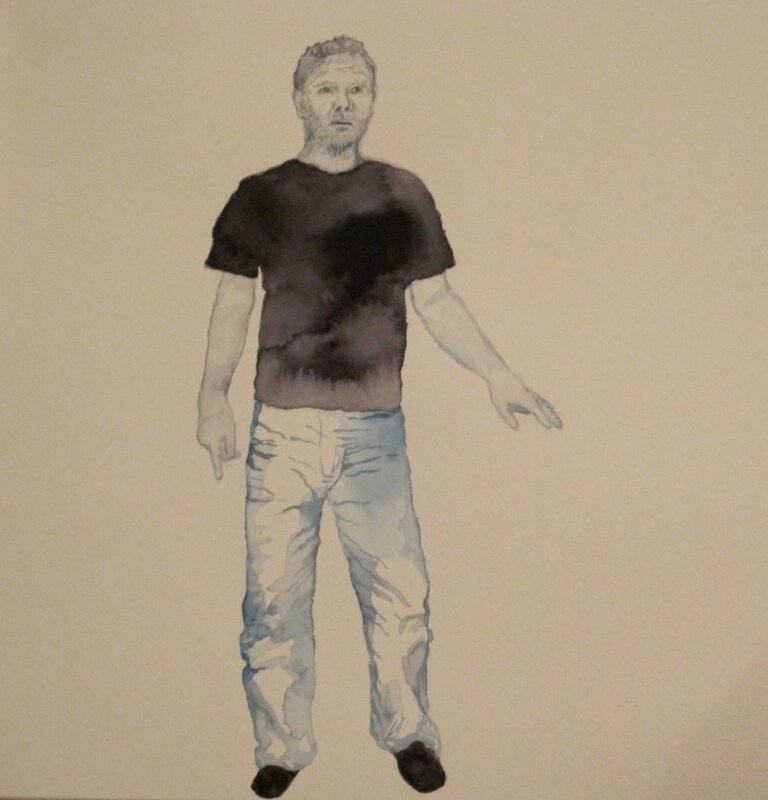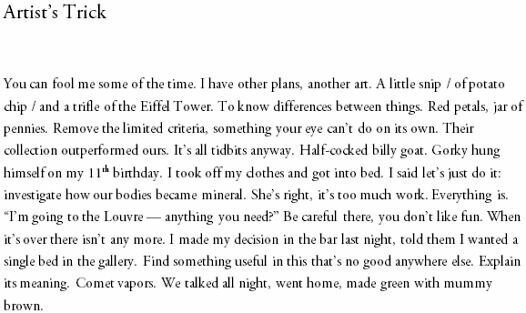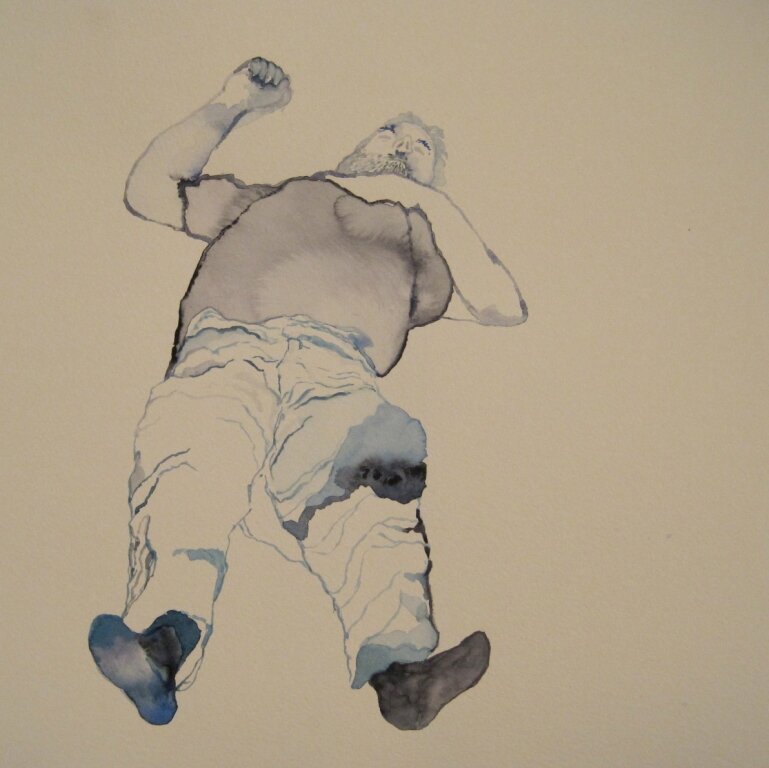NOTE: This is the third in a series of posts by Colie Hoffman about her experience while a writer-in-residence at Sangam House, India.
When I was in grad school, my friend Dave and I used to lift weights at the gym. The undergrad demographics at our university skewed largely male, so naturally, the weight room was populated almost exclusively by beefy, college-age boys. I was usually the only woman there, and Dave, a compact, physically efficient-looking sort of guy no taller than 5’7,” was the only man his size. Technically, we went together so we could help each other work out—but really, we went together for mutual protection. Alone, we’d get stared at. Together, neither of us had to be the only one getting stared at. Or, maybe it felt safer to get stared at together. Or, maybe we just noticed it less.
As a foreign woman in India, you get stared at almost constantly. (Though Indian women get stared at too.) Additional variables make it worse: having blond or red hair, being tall, wearing Western clothes, buying alcohol, and—my personal favorite—going running. The last time I went for a jog, two kids followed me down the path until they got to their house, where (I love this) they went inside and asked their mother to come out and look.
Sangam House and the dance village are stare-free—but the second I venture outside the gates, it’s unavoidable. So while this essay isn’t technically about either Sangam House OR writing, the experience of being stared at all the time is such an essential part of being in India that I couldn’t ignore it. And, as I prepare to leave Sangam House to travel around the country for the next six weeks, it’s going to take up even more space.
My main concerns are 1) What the hell? and 2) Why does this consume so much of my energy? Why do people do it here and not in the U.S.? Why does it feel so violating? And why does its message vary so much from one situation to another?
The Undressing Stare
This is by far the most common—and offensive—stare. Men look at you because you’re a woman, and because you’re there, and because they can. It helps if you’re white, because that adds to the novelty, but Indian women experience this all the time too. This staring, and all the inappropriate sexual behavior that can come along with it—“accidentally” brushing against you, adjusting the rearview mirror to look at your chest, lewd comments, and even just whipping it out—is why there are ladies’ sections on trains and buses. Well, theoretically there are.
The Novelty Stare
Some people—especially in rural areas where there aren’t many tourists—stare just because you are something different. With me they’re staring because I’m white (and a woman, and usually alone, which is unusual), but it’s possible they’d also stare if I were an Indian guy in a Western shirt and pants, or just anyone they’d never seen around. And when I say “stare,” I don’t mean the “stare and look away” spiel we do on the subway in New York—I mean people grasping you with their eyes until their vision is blocked by an interfering object. It’s like in the movies when the stranger comes into the small-town dive bar, the jukebox stops, and everyone gives him the narrowed eye.
It’s easy to forgive curious people for staring, the way it’s easy to forgive little kids for saying things in the grocery store line like “Why is that lady fat?” and “Mom, that guy has something on his face.” It’s still uncomfortable, but you can usually tell it’s harmless.
The Appreciation Stare
In a quest for photos of men staring (does it count as a quest if it’s easy?), my friend Mathilde (also a foreigner) and I walked the mile to the local chai shack. We got both the novelty stare (an old man at the shop) and a very efficient undressing stare (a bunch of laborers speeding by on a truck bed), but we also got a new one: the appreciation stare. A forty-something man rode by on his motorcycle, looked at us in a “you’re hot” way, and smiled. It was actually kind of nice—when you come to expect disrespectful behavior, you really appreciate it when people break the mold.
The Hostile Stare
This is the uncurious, judgmental stare women sometimes get from other women (and older men)—the one that says “why are you not following the rules.” Women (both Indian and foreign) get this for wearing clothing that more traditional women think is slutty: shorts, anything that bares the shoulders, or sometimes anything that at all shows the contours of a woman’s body (e.g., jeans). Men also give men this stare in a power struggle, just the way they would in the West.
The Mix
Lots of stares mix it up: hostility and curiosity, hostility and undressing, appreciation and curiosity, curiosity and undressing.
*
In the West, we see excessive staring as (at best) an invasion of our privacy or (at worst) a threat. , humans are programmed to stare for 3-5 seconds at anything new or unusual that doesn’t fit into the models our brains recognize. So, for example, when we see someone with a deformity, our lizard brain says “stare, determine threat and nature of object,” while our conscious mind says “don’t stare, it’s rude.” (For the sake of people with deformities, I hope we usually arrive at a non-obnoxious in-between.)
But this instinctive staring happens only once in a while, and for a very short span—and when no threat is determined, it’s over. This is not the staring of India. In India, men just gape unabashedly… forever.
At first my perspective was one of humility: Hey, maybe it’s not offensive here because people have different notions of privacy. But really, Indian women feel just as violated by it as foreigners do. Then I thought well, maybe it’s because people get married early—guys and girls can’t screw around in cars and behind the school when they’re 15, so this is what happens to all that built-up sexual curiosity. But that doesn’t make sense either: First, then women would be staring too, and second, just a couple generations ago in the U.S., people were getting married early and not allowed to screw around, and we did not have this situation.
A friend was recently telling me about being stared at and grabbed (crotch, breasts) by guys on the street when she was traveling in North India. In one incident, three boys rode by on a bicycle and one groped her. She ran after them, grabbed the offending boy by the arm, and lit into him: “What are you doing? What would you do if your mother or sister came home and told you someone did this to her?” Immediately he acted totally ashamed and was all “Sorry madam, so sorry madam.” When another man groped her on the street, she yelled at him and threw a bottleful of water on him, soaking his clothes. Everyone on the street knew exactly why. He acted ashamed, she said, but was he just publicly embarrassed or did he actually feel bad about his behavior?
So, if it’s not just natural, and men are ashamed of it when they get caught, I can’t help but draw the following conclusion: Men stare at and grope women simply because they can. Because no one will stop them. Plenty of women here face enough trouble and judgment just for being out of the house, and even more for being out of the house without a male escort. And deep down somewhere, men know their staring is an act of power: They wouldn’t dare stare at a man from their own town who was more powerful than they were.
But still: why aren’t they taught not to stare in the first place?
Polish people, pretending, wheatishness
When little kids play, they’re the best pretenders ever. But they’re notoriously unable to fake their emotions or hold back their real thoughts. In the Polish short film Anything Can Happen (Wszystko moze sie przytrafic), a father videotapes his young son riding his bike around a park where a lot of old people hang out. The boy stops and asks the old people whatever questions pop into his mind: “How old are you?” “Are you going to die soon?” And the people in the movie answer with such abandon! It’s as if they’re refreshed that someone finally said what was on his mind.
But at some point, society decides that a certain kind of pretending enables the world to function in a civilized way. We go to great (and sometimes ridiculous) lengths to restrain our impulses and to separate public from private. On a rush-hour train in New York, there might be so many people your face is smashed into some guy’s armpit, but your job is to pretend you are not looking at the armpit and definitely not looking at anyone’s face. You can stare, of course, but once that person catches you, the game is up. (Obviously I’m excluding mutual sexual attraction here.)
Or suppose you’re getting a massage: Intellectually, you know the context is therapeutic and the touch clinical. But to make the relationship work, both you and the therapist must actively pretend this clinicalness is the act’s entirety. That it is not, in fact, a stranger touching you while you’re naked and that there are no erotic implications on either side.
Imagine what might happen if we didn’t restrain these impulses and feelings—if everyone who wanted to sleep with his boss or his wife’s friend told them about it! Holy shit! At best, we face social consequences (embarrassment, divorce) for transgressing these rules. On a bigger scale, the law. Or job loss. Or, total descent into barbarism. And with good reason: It’s this grown-up pretending/restraint that lets us live with other humans with a base degree of safety and comfort.
It’s not like people in India have no sense of pretending—they definitely do. Hosts are ridiculously polite and generous to guests, as guests are expected be in return, regardless of everyone’s real feelings. If you check out the “matrimonials” section (akin to our “personals”) in any Indian newspaper, you’ll find them just as rife with euphemisms as ours—in American personals no one is fat, and here no one is darker than “wheatish.” And Indians have a mystifying inability to answer questions with “no” or “I don’t know,” so they just make up stories—a dance that can be totally entertaining when you learn to recognize it, but that really sucks when you need directions to the bus stop or, say, a real answer. I once spent half an hour in the post office with a friend who was trying to send postcards to Denmark, and rather than say “We don’t know the price and don’t know where to look it up,” the four (!) guys behind the desk insisted she bring in the cards so they could see their size. After trying to sell her some cards, of course.
How to get robbed anyway
In my previous post I talked about how much I was warned about things versus how much those things were worth being wary about. What’s paranoia, and what involves actual safety? What is it really worth my energy to avoid?
My first peace offering toward the staring was relaxation—the strategy I adopted regarding all alleged “scary things of India.” Just relax, let it happen, go with the flow. Logically, I thought, the amount of staring far surpasses the amount of unwanted physical contact. Most men stare (and if you’re a foreigner, a lot of women stare too), but how many of those people would dare touch you or even comment? Chances are higher if you’re alone and the men are in a group, or if you’re in a crowded place where it’s easy for someone to get away with something. But statistically, starers versus touchers (or masturbators, or anything else) is a laughably uneven comparison.
On the other hand, this situation is pretty different from getting malaria or stepping on a cobra. Sexual incidents (beyond staring) might be lower than the warnings advertise, but they’re not lower the way Japanese encephalitis is lower. And there’s no remedy or protection—you can’t go to the hospital because some guy showed you his penis, nor can you prevent him from doing it. But, certain precautions can help (or so they say). Thinking about it in this logical way makes me feel less anxious—but why doesn’t it make me feel better?
Here why: Because being stared at feels gross! It’s just gross to be groped, mentally undressed, commented upon, and generally feel your body become an item of public consumption—and it’s worse when no one considers the behavior inappropriate enough to combat, because you know it’s not just happening to you. (You also know that when the staring turns into concrete physical harassment, you’re out of luck unless you can do something about it yourself.) And I’m not even talking about the threat some Indian women face daily as a matter of survival, or all the ways this behavior contributes to a culture in which rape and sexual assault are trivialized and unreported—I’m just talking about feeling on guard every single minute. No, it’s not rape—but it definitely takes away from your freedom and from energy you could be spending on other things, like being alive. It’s basically like you’re guaranteed to be robbed and have to watch your stuff all the time, and then get robbed anyway.
Turn to the dead people page
Indians don’t squelch their curiosity the way we do in the West, which can be refreshing and lovely and creepy and also wildly invasive. In its first few pages, the Deccan Herald (a major daily paper) always runs a few juicy, horrifying death stories—a murder involving a multi-caste love triangle, a stampede at a religious site, drownings from a truck accident. But unlike U.S. papers, which would print sterile photos of the rescue crew at work or the accident site or yearbook photos of the dead, papers here print the photos that the dark, dirty, Law & Order-watching part of us secretly longs for—bodies in a pile near the temple, bodies being fished out of the river, bodies drooping lifelessly as a fireman carries them away.
Whatever the reason, in India people have a different sense of what’s public and what’s private. Personal space (the way we think of it) is a foreign concept here—buses and autorickshaws are packed beyond imagination, and the streets, even in small towns, are riddled with people, dogs, cars, motorbikes, cows, and pretty much everything else. Poor people often live in one-room houses where a whole family sleeps together. (How such families get made, I don’t know. And I’m not being an ass—I really don’t know how people get the privacy to have sex.)
A vision of hell
On the innocent side, this curiosity and lack of private space means total strangers don’t feel rude asking you questions like “Are you married?” “How much money do you make?” and “Do you have any children?”—and if you’re blond, just going ahead and touching your hair.
On the not-so-innocent side, a writer from Calcutta was telling me that some people there (slum-dwellers, mostly) have no private access to water, so they bathe using public taps or the Ganges. To do their business, they use public bathrooms (anyone seen Slumdog Millionaire?) or just the street. Without a bathroom, these people have no privacy, ever. If that sounds unimaginable, add to it the reality that women on the street are bathing with their saris on—and passing men, hoping to glimpse bare flesh, stare at their every move as they shift the cloth around bit by bit, washing each part of their bodies.
Along those lines: My friend was once the only woman on an eight-hour bus ride here. She’s foreign and was traveling alone, and the rest of the bus was packed with Indian men watching her every move. If she scratched her head or turned the page of a book, their eyes followed. Exasperated (and creeped out), she finally covered her head and face with a scarf to give herself the illusion of privacy. It took mere minutes for a man to pop up right in her face and ask, “Which country? Which country?” To top it off, there were no toilets along the way, so at every bathroom break all the men poured out of the bus and pissed along the side of the road. My friend, however, with no trees or bushes in sight, was not about to get out and drop her pants with 30 men watching her. She held it for eight hours, while she had a bladder infection. That… that is my vision of hell.
*
Besides the actual staring, the crazy part to me is that women here have somehow gotten used to it. They find it creepy and offensive too, but for the most part, they accept that it’s how things work—that it’s a part of daily life they can’t waste energy on. But there are people who are actively fighting against it. A friend of mine in Mumbai works with an anti-street harassment campaign called Blank Noise, which holds events where women descend in large groups on specific places in the city—spots where men usually hang around to just… stand there and stare at women. Essentially, the women take that space for themselves. The campaign also takes pictures of men in the act, advocates ways to respond, and offers general moral support.
Despite all this, there is a flip side: When men do something nice and don’t act creepy, you appreciate it infinitely more. And over time, you grow more intuitive about people’s intentions in general. A couple days ago, two women friends and I were walking on a rural road when a man driving a logging truck slowed down and offered to give us a ride to the nearest village. We weren’t going that far, but were so warmed by his honest intent, and his non-leering, that we wanted to take him up on it just to show how much we appreciated him.
So thanks, logger-truck guy. Here’s to you and all the classy Indian guys.










